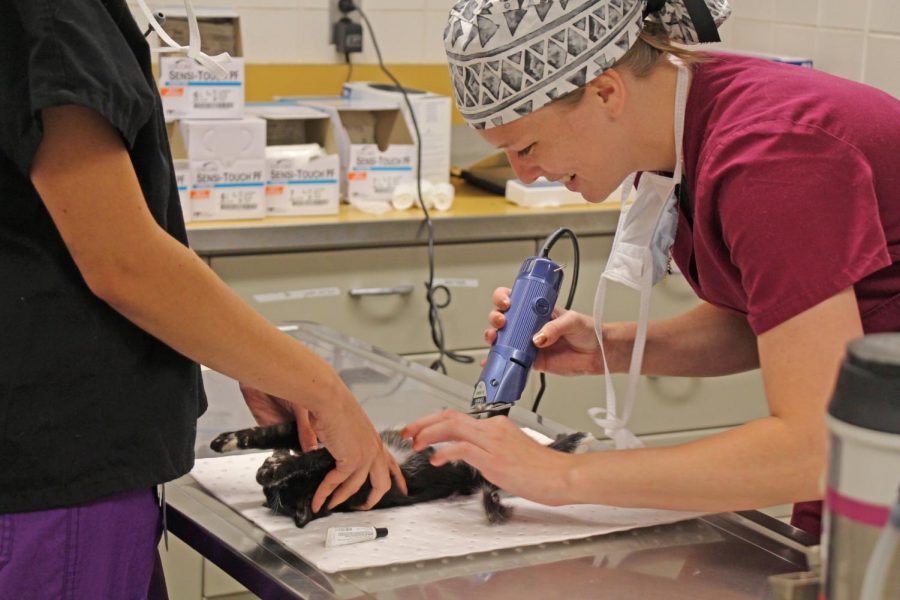Community Cat Day helps feral cats
Photo courtesy of Loukia Agapis
University veterinary students prepare a cat for surgery. Spaying and neutering are two of the procedures that will be performed on almost 500 feral cats to reduce unwanted pregnancies and control the feral cat population.
September 20, 2018
The University’s Shelter Medicine Program launched an initiative that provides opportunities for Veterinary Medicine students to gain hands-on experience while improving the health of feral cats.
The program, called Community Cat Day, was made possible by a $15,000 grant from the Best Friends Animal Society, which covers the costs of spaying, neutering, vaccinating and microchipping approximately 500 feral cats within a 90-mile radius in Champaign County.
Dr. Loukia Agapis, head of the program, said Community Cat Days will be held monthly during the fall and bi-monthly through the winter months. The program is set to conclude in March 2019.
“During the actual clinical day, veterinarians, veterinary nurses and students perform the majority of the services,” Agapis said in an email. “Volunteers from our partner organizations help promote the program, transport our furry guests and get them registered.”
Jessica Sempek is the founder and director of Hospice Hearts, which is one of the partner organizations.
Get The Daily Illini in your inbox!
Using the help of social media, Sempek was able to recruit enough people to help bring approximately 40 cats to receive basic care at the first Community Cat Day on Sept. 8.
Sempek said she has been trapping and caring for feral cats for about five years and thinks Community Cat Day is important for controlling feral cat populations and protecting public health.
“We obviously want the animals that are essentially wild vaccinated against rabies,” Sempek said. “The spaying and neutering reduces unwanted pregnancies and helps reduce the feral cat population in our community.”
Agapis said Community Cat Day begins early in the morning, with students and staff organizing surgical lists and designating duties. When the cats arrive at the University, they are separated into temporary housing before being prepped for surgery.
“All of the cats are held overnight in predetermined areas, where their caretakers can monitor them overnight as they recover from their surgery,” Agapis said. “If there are any socialized cats that would do well as pets, our volunteers find families for them. Some cats are even adopted out to barn homes. Cats that are truly feral return to their outdoor homes to be with their familiar colony.”
Victoria McKaba, second-year student in Veterinary Medicine, assisted third- and fourth-year students in the sedation, preparation and recovery of the feline patients.
“This program is an incredible way to get hands-on experience with cats that are feral,” McKaba said in an email. “There are different precautions you have to take with these cats because they are not used to being handled by people and are often very scared.”
Cassie Saufley, fourth-year student in Veterinary Medicine, was able to perform physical exams, give vaccinations and spay female cats. She said the hands-on experience is important to her development as a rising veterinarian.
“It is essential that students can show their surgical skills to future employers, as spays and neuters are typically part of every workday,” Saufley said in an email. “Physically being able to touch and work with live animals is critical in learning how to properly perform the surgeries being taught.”
In the first Community Cat Day, approximately 80 cats received care. Saufley said the cats not only benefit from being spayed or neutered but also benefit from receiving physicals and vaccinations.
“These cats likely would not have ever seen a vet in their lives, so providing these services can improve their well-being, even if it is for a small period of time,” Saufley said.







